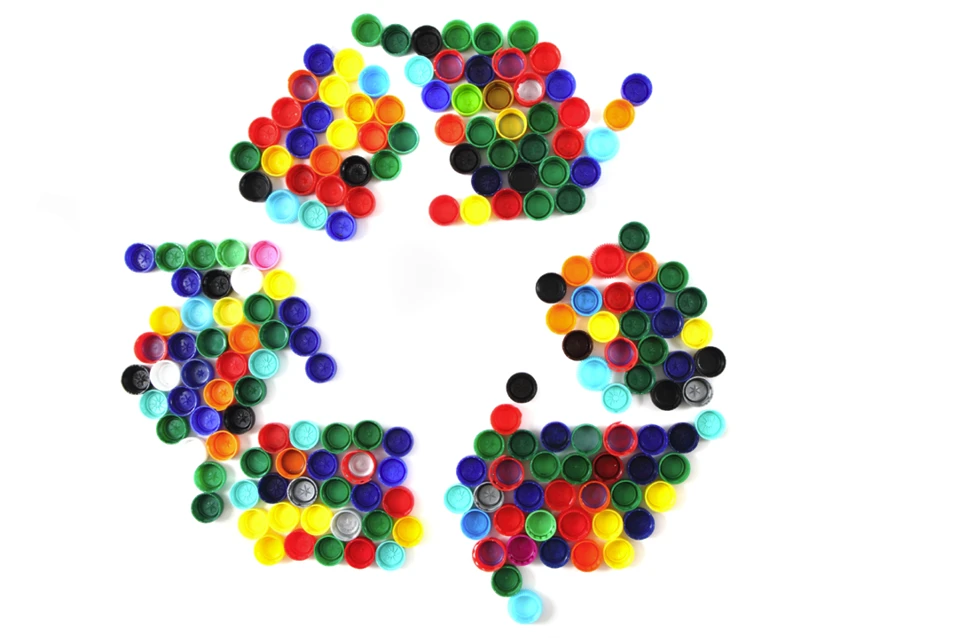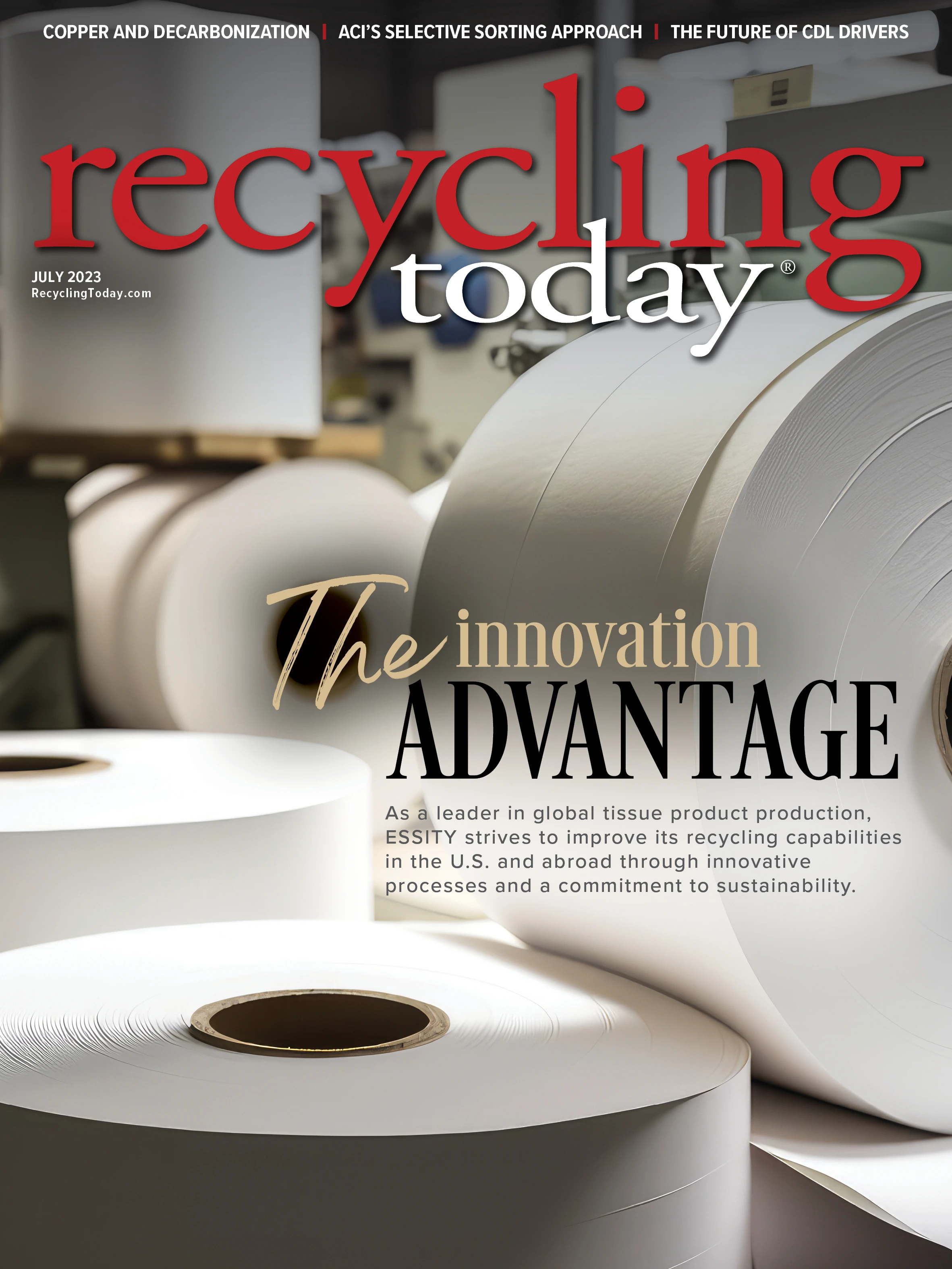

The qualities that allow plastics to be used in a wide range of products, such as eyeglasses, clothing, furniture, flooring, automobiles, electronics and packaging, also are the same qualities that make plastics one of the most complex and challenging materials to recover and recycle. Even the word “plastics” is a gross simplification of the range of resins, technical qualities and applications of a material that has become central to modern life. The inherent complexity comes with the challenge of creating more sustainable and circular management solutions for plastics.
A circular shift
The circular economy is a shift in the way industry thinks about waste and how we derive value from the materials we produce. In a circular economy, there is no waste; instead, this material feeds a new cycle of production, reducing the demand for raw materials, including virgin plastics.
In a world increasingly strained for resources and suffering from the consequences of consumption that is out of balance with natural systems, striving to develop a circular economy for plastics presents myriad possibilities and significant challenges. It is necessary to drive action toward more sustainable solutions in collecting, sorting and developing end markets for this fossil fuel-based material. As we navigate toward a circular economy, more sustainable materials and models will continue to grow, including redesigning products, scaling reuse and reduction models and improving recycling systems.
To support this shift to a circular economy—which includes addressing plastics in a way that aligns with the mission of the Ellen MacArthur Foundation—Resource Recycling Systems (RRS), a recycling and sustainability consulting firm based in Ann Arbor, Michigan, has deployed the NextCycle model.
NextCycle is designed around accelerating solutions toward a circular economy where “waste” is no longer part of the system and is adapted to meet specific regional, statewide and national needs. NextCycle’s model provides businesses with coaching and technical expertise, driving data, partnerships and investment.
Launched in Colorado, Michigan and Washington, NextCycle programs have supported 107 participants, including businesses and community projects, nearly one-quarter of which address plastic streams and even more that address solutions to the plastic pollution crisis. Solutions include reducing the use of materials; ensuring valuable materials are collected while driving a market for lower-value products; innovating sorting and processing to fully recover useful materials; and ensuring recovered materials feed into new products.
NextCycle participants are supported in navigating available funding pathways and preparing their initiatives for funding. They are matched with partners, culminating in a Pitch Showcase where teams pitch their project’s value proposition to funders, investors and colleagues. Already, $41 million has been tracked for supporting solutions implemented by NextCycle participants, $14.5 million of which have been applied toward solutions addressing plastics and plastic circularity.

Plastic projects
Plastics projects across the three NextCycle states are diverse, with different focus areas, varying levels of readiness from startups to mature organizations and different places in the supply chain.
NextCycle Colorado emphasizes innovation and technology and has teams addressing challenges across the plastics supply chain. NextCycle Michigan supports private and public sector participants that are uniquely focused and include improved and increased plastic recycling access, processing or new markets. NextCycle Washington boasts teams tackling reduction and reuse models with a specific focus on community impact driven by voices that have been part of a co-design and co-governance strategy.
Across programs in each of these states, teams involved in the plastics value chain are collecting and processing end-of-life plastics, addressing challenging plastic products and resins and driving investment in solutions.
Industry innovations
California-based sorting equipment company Glacier, a NextCycle Michigan participant in the first Recycling, Innovation and Technology Track, is leveraging opportunities in Michigan and Washington. The company brought its robotics and artificial intelligence technology to be piloted in Michigan, partnering with material recovery facilities (MRFs) to sort recyclables more efficiently and affordably.
In Washington, Glacier joined the first cohort with the potential impact of installing one Glacier robot in each of the state’s 264 MRFs, potentially resulting in 84,700 incremental tons collected annually— $68.2 million in revenue. With more efficient, cost-effective and precise sorting capabilities, materials are poised to enter the market with more potential for value and the ability to be used in new products.
NextCycle also is supporting solutions that address more challenging materials. Colorado Team FoamCycle participated in the first cohort of a program focused on building partnerships with Colorado municipalities to scale drop-off stations to collect and densify expanded polystyrene, or foam packaging, which is light and difficult to compact, affecting transportation and collection. Additionally, minimal markets mean this material traditionally has been destined for landfill.
FoamCycle effectively collects and processes this material to create recycled picture frames that are then sold to the communities sponsoring the collections.
During accelerator programming, FoamCycle was able to build connections with Colorado municipalities, navigate specific challenges and opportunities and discuss partnerships with foam and other manufacturers to build its system.
Challenging plastics
Finding homes for the kinds of plastic products that end up unsold on the shelves of resale shops is challenging. Goodwill Industries of West Michigan was seeking to reduce its waste stream and find a solution for plastic products from furniture, children’s toys and shelving units to storage totes, tubs and crates.
Through NextCycle Michigan, the organization partnered with HydroBlox, a water infrastructure company looking to increase its use of postconsumer plastics in its stormwater drainage systems. Goodwill and HydroBlox formed a joint venture to manufacture stormwater drainage systems and keep Goodwill’s nearly 1 million pounds of plastic out of local landfills.
Nick Carlson, business development director for Goodwill Industries of West Michigan, shared this story in Toronto while presenting a sustainability tracking software developed in-house. The audience of Goodwill CEOs and board chairs from across the country was eager to hear more about the HydroBlox deal. With 155 Goodwill organizations and more than 4,000 stores globally, the potential for scaling this solution is compelling.
“Goodwill sits in a unique position to be able to manage postconsumer durable goods waste,” Carlson says. “We have a vision to find homes for all the products we receive. Our partnership with HydroBlox is an important step for us in eliminating plastic waste through our donated goods supply chain. We are also working on technologies to eliminate other waste sources, such as glass, wood and even cotton and polyester textile waste. We are extremely grateful for NextCycle Michigan and the work they do in connecting problems to solutions,” he continues.
Carlson adds the HydroBlox manufacturing operation is set to launch by early summer 2023 in Muskegon, Michigan.
Vartega joined NextCycle Colorado as an early-stage carbon fiber recycler with a focus on expanding the recycling of thermoplastics into composite materials for advanced manufacturing. The project is part of creating a valuable market for materials recovered from consumers, given that thermoplastics typically are a low-value commodity reused in a value-added product, encouraging additional recovery.
Through Nextcycle programming, Vartega learned about Colorado’s plastics supply chain landscape, completed more in-depth evaluation of the project’s feasibility and focused on establishing partnerships for local feedstock suppliers and producers willing to integrate upcycled composites into their products.

Following NextCycle Colorado programming, Vartega was awarded a $364,000 Recycling Resources Economic Opportunity grant from the state to fund its expansion and create new jobs.
Because of its experience with NextCycle Colorado, Vartega was quick to explore NextCycle Michigan’s offerings when it launched the following year and received additional funding from the state’s Department of Environment, Great Lakes and Energy, or EGLE, to expand its carbon fiber recycling business.
By 2021, the team expanded its partnership with Braskem, a U.S.-based polyolefins and biopolymers producer, to include 100 percent-recycled carbon fiber filament for 3D printing.
Denver-based Sana Packaging targets the cannabis market, developing packaging for a circular economy using hemp-based plastic, reclaimed ocean plastic and more. Sana establishes strategic partnerships with manufacturers and cannabis companies to supply sustainable packaging for retail sales, with the aim of creating a closed-loop system for polypropylene, high-density polyethylene and other packaging materials.
While some solutions are innovating new composites from recycled plastics, others are pioneering a form of recycling focused on engineering enzymes to recycle plastics into virgin-quality material. Birch Biosciences, a NextCycle Washington team, is working to scale its “molecular scissors” (engineered enzymes) to bring plastics back to the form of “building blocks” to be used as virgin plastics, helping to address the challenge of plastics that get recovered but downcycled into lower-value products.
Driving investment
NextCycle Colorado initially was envisioned as a better alternative to traditional grant-making, providing vetting of project proposals and aligning limited state funding to prioritized projects. NextCycle Michigan took it further by seeking partner investments to bolster EGLE funding.
Closed Loop Partners is offering up to $5 million per project in zero or below-market interest loans in each NextCycle state for projects aligned with its mission. The Carton Council, the Foodservice Packaging Institute and others are ready to provide grant matching funds for projects and teams unable to supply the required match, with Carton Council committing $1 million to qualifying NextCycle projects over three years.
NextCycle Michigan, through its partner Centrepolis Accelerator of Lawrence Technical University, earned a $1.6 million Economic Development Association Build to Scale grant to amplify and accelerate projects by providing technical assistance with an emphasis on underserved businesses and communities.
As NextCycle teams and partners innovate additional pathways to recover plastics and have value-added markets for them, they also are building the foundation for how plastic alternatives could be recovered in addition to the plastics we are working to manage now.
NextCycle is helping drive circular solutions for plastics as well as other materials by pairing innovative solutions and development with the appropriate investments.
Get curated news on YOUR industry.
Enter your email to receive our newsletters.

Explore the July 2023 Issue
Check out more from this issue and find your next story to read.
Latest from Recycling Today
- Green Cubes unveils forklift battery line
- Rebar association points to trade turmoil
- LumiCup offers single-use plastic alternative
- European project yields recycled-content ABS
- ICM to host colocated events in Shanghai
- Astera runs into NIMBY concerns in Colorado
- ReMA opposes European efforts seeking export restrictions for recyclables
- Fresh Perspective: Raj Bagaria






